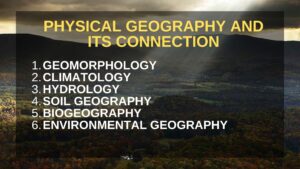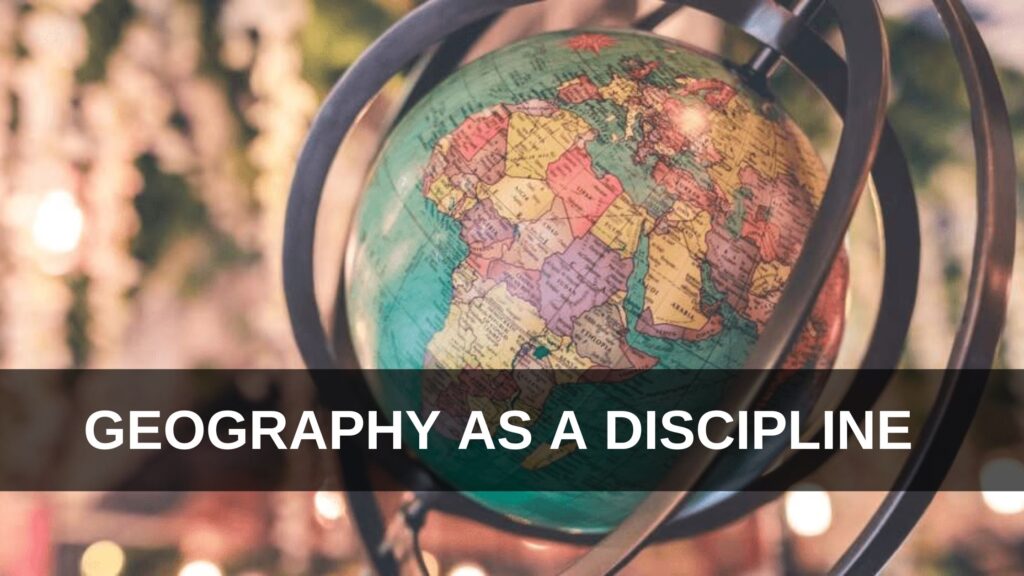Geography is a fascinating subject that helps us understand our planet and the way humans interact with it. The word “Geography” comes from the Greek words ‘Geo’ (Earth) and ‘Graphos’ (Description). In simple terms, it is the study of the Earth’s physical features and how humans influence and adapt to them.
Did You Know?
Eratosthenes, a Greek scholar (276-194 BC), is considered the first geographer. He was the first person to calculate the Earth’s circumference and developed a system of latitude and longitude, making significant contributions to the field of Geography.
Download notes of The Mauryan Empire: Rise, Administration
Why is Geography Important?
Geography plays a crucial role in understanding the world. It helps us comprehend how different natural and human-made processes shape our environment and influence our lives. The knowledge of Geography is essential for disaster management, urban planning, environmental conservation, and understanding climate change.
Geography as an Integrative Discipline
Geography serves as a bridge between natural sciences (like geology, meteorology, and ecology) and social sciences (such as economics, history, and political science). It helps in:
- Understanding climate patterns and their impact on human life.
- Studying landforms and their influence on human settlements.
- Analyzing economic activities and resource distribution.
- Examining political boundaries and international relations.
The Core Questions in Geography
Geography revolves around three fundamental questions:
- What? Identifying patterns of natural and cultural features.
- Where? Understanding the distribution of these features across different locations.
- Why? Analyzing the reasons behind their occurrence and spatial distribution.
These questions form the basis of geographical studies and help in making sense of the world.
Branches of Geography
Geography is broadly classified into two main branches: Physical Geography and Human Geography.
Physical Geography and Its Connection with Natural Sciences
Physical Geography is closely linked with various natural sciences and focuses on understanding natural processes and landscapes. It includes:
- Geomorphology: Study of landforms, their formation, and evolution.
- Climatology: Study of weather, climate patterns, and atmospheric processes.
- Hydrology: Study of water bodies like oceans, rivers, and lakes.
- Soil Geography: Understanding soil formation, types, fertility, and distribution.
- Biogeography: Examines the spatial distribution of plants, animals, and ecosystems.
- Environmental Geography: Focuses on environmental issues like pollution, land degradation, and conservation.

Human Geography and Its Connection with Social Sciences
Human Geography focuses on the relationship between people and their environment. It includes:
- Social/Cultural Geography: Studies societies, cultures, and their spatial dynamics.
- Population and Settlement Geography: Analyzes population growth, migration, and settlements.
- Economic Geography: Covers industries, agriculture, trade, and transport.
- Political Geography: Examines boundaries, governance, and political interactions.
- Historical Geography: Studies the historical evolution of regions and their spatial characteristics.
Approaches to Studying Geography
There are two main approaches to studying Geography:
1. Systematic Approach
- Introduced by Alexander Von Humboldt (German geographer, 1769-1859).
- Studies geographical phenomena across the world and identifies patterns.
- For example, studying global climate patterns and how they affect different regions.
2. Regional Approach
- Developed by Karl Ritter (German geographer, 1779-1859).
- Focuses on studying specific regions holistically.
- For example, studying the geography of India by analyzing its mountains, rivers, climate, and human activities.
Specialized Branches of Geography
In addition to the primary branches, there are several specialized fields in Geography:
- Geo-informatics: Uses modern tools like Remote Sensing, GIS (Geographic Information Systems), and GPS (Global Positioning System) for geographical analysis.
- Cartography: Study and practice of making maps, both manually and digitally.
- Transport Geography: Studies movement and connectivity through transport networks.
- Urban Geography: Examines urban settlements, planning, and infrastructure development.
- Medical Geography: Investigates health patterns and diseases in relation to geography.
Geography in the UPSC Exam
Geography is a vital subject in the UPSC Civil Services Examination as it overlaps with various topics in General Studies Paper I and GS Paper III (Environment & Disaster Management). It is also one of the most popular optional subjects in the Mains exam.
Why is Geography Important for UPSC?
- Helps in understanding Indian and world geography.
- Assists in answering questions related to environment, climate change, and biodiversity.
- Provides insights into disaster management and urban planning.
- Useful for writing analytical answers in the Mains exam.
Download notes for Annexation of Sindh and Punjab by the British
FAQs related to Geography as a discipline
Q1: What is the basic definition of Geography?
A: Geography is the study of Earth’s physical features and human interactions with them. It helps in understanding the spatial distribution of natural and cultural elements.
Q2: How is Geography related to other sciences?
A: Geography integrates knowledge from both natural sciences (geology, meteorology) and social sciences (economics, political science). This makes it an interdisciplinary field.
Q3: What are the two main ways to study Geography?
A: The Systematic Approach (studying global patterns) and the Regional Approach (studying specific regions in-depth).
Q4: Why should UPSC aspirants study Geography?
A: Geography is crucial for UPSC as it helps in understanding environmental issues, geopolitics, and socio-economic development. It also forms a significant part of the General Studies syllabus.


